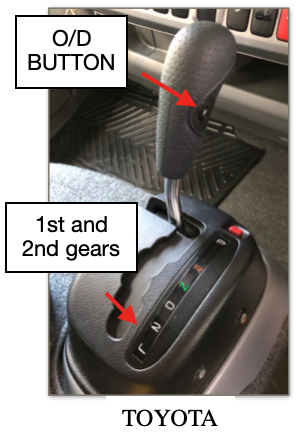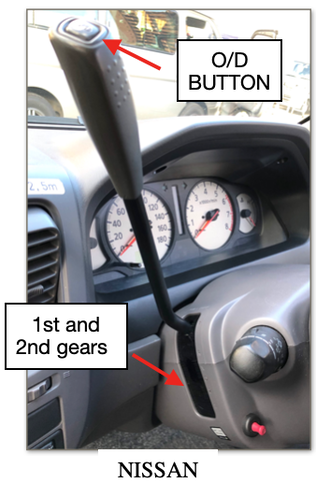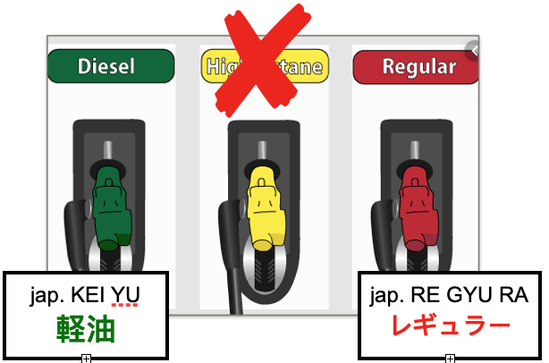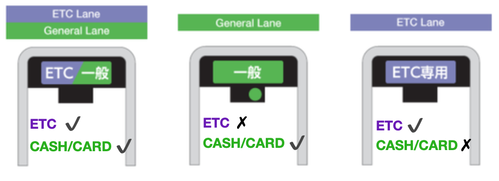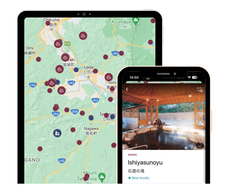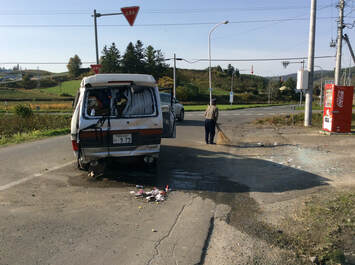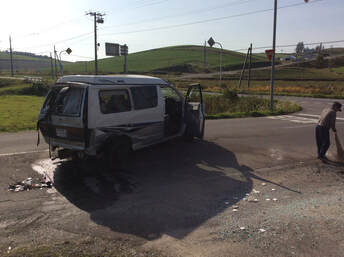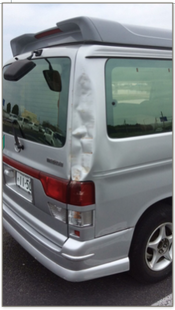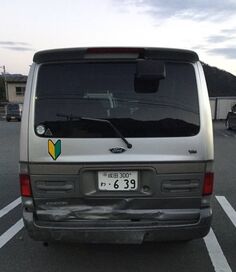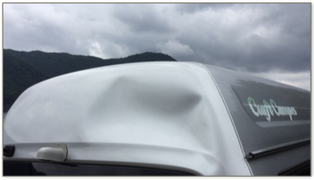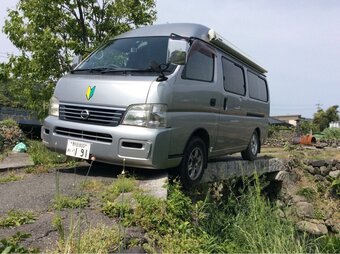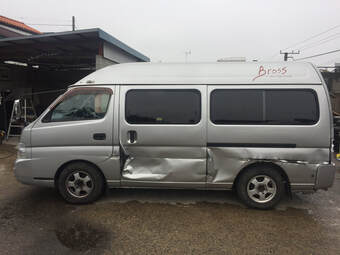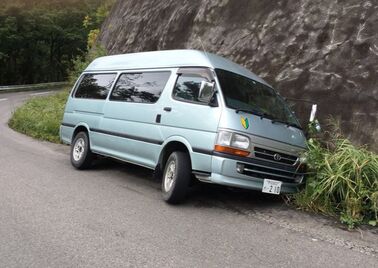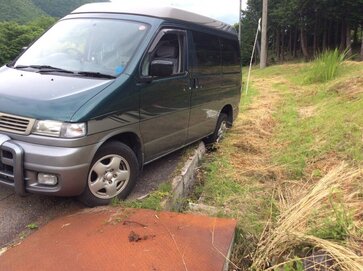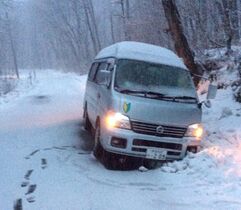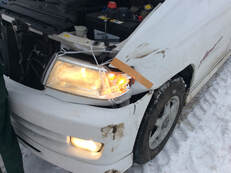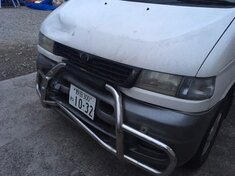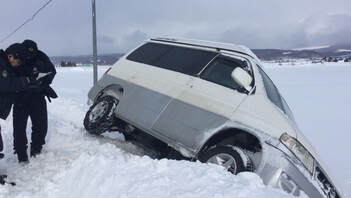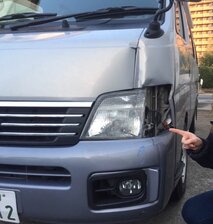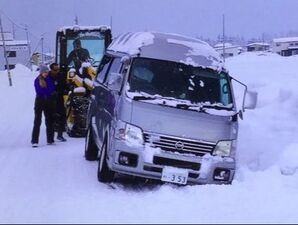Welcome to Japan and Japan Campers !
Thank you for renting from our company. To make sure your journey is without major issues and that you return home safely, please make sure you familiarize yourself with the following very important points which you are required to observe while driving in Japan.
Japan Campers is in no way responsible for your lack of knowledge. Please remember that "Ignorantia juris non excusat" (latin) which means "ignorance of the law excuses not".
Japan Campers is in no way responsible for your lack of knowledge. Please remember that "Ignorantia juris non excusat" (latin) which means "ignorance of the law excuses not".
1. RULE NUMBER 1 IN JAPAN
Pedestrians, Bicycles and Motorbikes have absolute priority and a right of way in any situation! Injuring an innocent person will definitely result in you facing severe consequences!
Please be especially careful with bicycles, because they travel fast and may come from any direction without watching out for you. You are always at fault if you are involved in such an accident.
Please be especially careful with bicycles, because they travel fast and may come from any direction without watching out for you. You are always at fault if you are involved in such an accident.
2. STOP SIGN

Whenever you see the STOP sign (jap. 止まれ - tomare) you need to make a complete stop and give way. The STOP sign is usually placed well before the intersection, so if required you need to stop twice.
3. RAILWAY CROSSINGS
There are no STOP signs in front of railway crossings, yet you are required to make a complete stop before each railway crossing even when the barriers are opened. Make sure the car in front of you has already cleared the crossing before you enter the crossing.
4. SPEED LIMITS
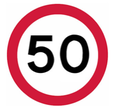
The Signs in Japan show the speed limit in kilometres per hour - not miles per hour.
The speed limits (unless limited by the traffic signs) are as follows:
- 50 km/hr - in Cities
- 60 km/hr - outside Cities
- 100 km/hr - on Highways
Note! Most Japanese drivers drive well above the allowed speed limit risking heavy fines. We recommend that you keep your speed within the limit.
The speed limits (unless limited by the traffic signs) are as follows:
- 50 km/hr - in Cities
- 60 km/hr - outside Cities
- 100 km/hr - on Highways
Note! Most Japanese drivers drive well above the allowed speed limit risking heavy fines. We recommend that you keep your speed within the limit.
5. PARKING in JAPAN

Parking in places which are not clearly marked as Public Parkings is strictly prohibited. Illegal parking fine is approx. 15,000 JPY.
If you ignore our warning and still get one (usually a yellow tag-sticker on the front window), please go to the nearest Police Station and make sure you pay it by yourself. Unpaid fines will be sent quickly to our office. If we need to pay the fine on your behalf, we are required to go to a Police Station, make a report and pass your personal information. This will be charged 10,000 JPY extra.
If you see a place that looks like a parking with many cars already parked (but no signs) - it is probably a private parking. If you leave the van there you may end up paying 50,000 JPY as the van will probably be towed away.
Be extremely careful when parking next to another van, because even the slightest damage (or even a small paint scratch) to it will result in insurance claim and you may lose a lot of $$$.
If you ignore our warning and still get one (usually a yellow tag-sticker on the front window), please go to the nearest Police Station and make sure you pay it by yourself. Unpaid fines will be sent quickly to our office. If we need to pay the fine on your behalf, we are required to go to a Police Station, make a report and pass your personal information. This will be charged 10,000 JPY extra.
If you see a place that looks like a parking with many cars already parked (but no signs) - it is probably a private parking. If you leave the van there you may end up paying 50,000 JPY as the van will probably be towed away.
Be extremely careful when parking next to another van, because even the slightest damage (or even a small paint scratch) to it will result in insurance claim and you may lose a lot of $$$.
6. ZERO ALCOHOL POLICY

The legal alcohol limit in Japan is 0%. This means, unlike most countries, you cannot drive after having the smallest drink. Japan uses "Shared Responsibility law" which means that penalty for drinking and driving is 300,000 JPY for each adult in the car.
7. DRIVING UP and DOWN HILLS
All Japan Campers’ vans are equipped with an automatic gearbox include parking gear (P), reverse (R), neutral (N), drive (D) and additionally 2nd gear (S or 2), 1st gear (L or 1) and overdrive gear button (O/D)
Japan is a very mountainous country with over 70% of the country being mountains, that’s why always make sure you use 2nd and 1st gear to reduce speed when driving down hills. Using the brakes constantly to slow down will definitely overheat the wheel rotors and you may not be able to stop the van when really required.
Make sure you do not drive with "overdrive" off, because this can cause a much greater fuel consumption (when it’s off you will see “O/D off" or “HOLD” light on the dash). In short: Overdrive is like the highest gear, if you turn it off the car will run at higher revs.
Japan is a very mountainous country with over 70% of the country being mountains, that’s why always make sure you use 2nd and 1st gear to reduce speed when driving down hills. Using the brakes constantly to slow down will definitely overheat the wheel rotors and you may not be able to stop the van when really required.
Make sure you do not drive with "overdrive" off, because this can cause a much greater fuel consumption (when it’s off you will see “O/D off" or “HOLD” light on the dash). In short: Overdrive is like the highest gear, if you turn it off the car will run at higher revs.
8. GASOLINE or DIESEL
Make sure you know the type of fuel your van uses. Pouring the wrong fuel into the tank will result in engine damage and you will be fully liable for the damages. Damages resulting from pouring the wrong fuel are NOT COVERED by any insurance and must be covered by you.
9. SAFE CLEARANCE
Make sure you know your vehicle hight. Most major roads have a maximum clearance of 4,0 meters and the vans are OK to drive on them. There are however, some tunnels and especially parking places where you will not be able to drive.
Safe clearance is as follows:
◆ 2,0 meters - Miniature Campervan Wink
◆ 2,1 meters - Nissan Nova & Mid-Size Mazda Bongo (flat roof)
◆ 2,5 meters - Big Campervans
◆ 3,2 meters - Motorhomes
Safe clearance is as follows:
◆ 2,0 meters - Miniature Campervan Wink
◆ 2,1 meters - Nissan Nova & Mid-Size Mazda Bongo (flat roof)
◆ 2,5 meters - Big Campervans
◆ 3,2 meters - Motorhomes
10. INSURANCE COVERAGE
A Standard Third Party Insurance is included in your rental fee. In case of a first accident (reported to the Police) you will be required to pay deductible 100,000 JPY (150,000 JPY Nissan Nova, 200,000 JPY Motorhomes) to the insurance company. Each additional accident will require 150% of the previous Access Fee. Please understand that even the smallest scratch caused to a third party vehicle / property is usually classified as an accident.
Damages (due to your own fault) made to Japan Campers' vehicles, are not covered by our standard insurance and depending on the damage you may be charged maximum 300,000 JPY for the repair costs.
Damages (due to your own fault) made to Japan Campers' vehicles, are not covered by our standard insurance and depending on the damage you may be charged maximum 300,000 JPY for the repair costs.
TYPE OF DAMAGE |
DESCRIPTION |
MAX CHARGE |
COMMENT |
DAMAGES WITH LOW CHARGES |
Damages that are easy to be repaired/ painted will be charged at the possible minimum rate. For example light scratches and dents. Damages to interior and equipment. |
30,000 JPY |
Assessed by JC staff |
SLIGHT AND MEDIUM DAMAGES |
Slight and Medium damages will be charged when they need some time (and /or parts) to be repaired. This category includes scratches or dents on external and internal car elements (i.e. doors, bumpers, wheels, mirrors etc) |
100,000 JPY |
Charge depends on the damage based on the actual repair cost |
SERIOUS DAMAGES |
Serious Damages will be charged when they involve an element replacement (i.e. Bumper) or when the restoration requires a number of days, or when a replacement is needed due to regulations, safety or appearance reasons. This category includes bodywork, lights, tires and windscreen damages |
300,000 JPY |
Charge depends on the damage based on the actual repair cost |
DAMAGES DUE TO NEGLIGENCE |
Broad category of damages assessed by our insurance company on "case by case" basis |
Up to the Vehicle price |
Charge depends on the damage based on the actual repair cost |
Insurance coverage will not be provided in case of an accident caused by the following conditions or driving habits:
|
|
11. PROCEDURES IN A CASE OF ANY ACCIDENT
- Help the Injured and provide first aid as much as possible until help arrive
- Call the Emergency Services (or ask somebody to call for you)
- Police number -> 110
- Ambulance number -> 119 - Gather Informations:
- Take as many pictures as possible from the scene of the accident,
- Note the place, time, and situation in which accident happened,
- Collect and exchange the third party details (name, address, tel number, car registration number),
- Collect information about Policeman in charge (name, tel. number, Police Station address).
- Contact Japan Campers and follow the instructions
- Japan Campers Support (+81)-70-3167-4731 (070-3167-4731 calling from Japan)
- Toshimi (+81)-80-5041-5243 (080-5041-5243 calling from Japan),
- Michael (+81)-80-4950-9106 (080-4950-9106 calling from Japan),
- Maciek (+81)-80-3466-5270 (080-3466-5270 calling from Japan),
Important!
- Regardless of who was at fault, if an insurance claim is made you need to deposit a new Excess Fee (150% of amount written on the contract) into Japan Campers Bank account within 24 hrs. Please ask for banking details when needed. If Excess Fee is not paid, we may reposes the vehicle and cancel your rental contract without further notice.
- Unless the accident caused any personal injury, Police will not decide who was at fault. This job is left for the insurance companies, so make sure the Police writes down your side of the story.
- 10,000 JPY is charged for processing each insurance claim made on your behalf.
- If you do not receive a police report, you will be responsible for the total cost of repairs and any additional claims.
12. HOW TO USE THE HIGHWAY
Japanese Highways are always a toll road and can get quite expensive (average 2,000 JPY for 100km). You may pay the tolls with cash, credit cards or you can rent a special ETC card that allows you to drive through highway gates without stopping. The fees are paid when you return the van.
Note: With the ETC system, it is easy to lose track of your highway spending and end up with a large bill to pay when you check out. Japan Campers staff is unable to monitor your spending during your trip. Please let us know during check-in if you want to rent a card.
Note: With the ETC system, it is easy to lose track of your highway spending and end up with a large bill to pay when you check out. Japan Campers staff is unable to monitor your spending during your trip. Please let us know during check-in if you want to rent a card.
- Choose green gates at the entrance of the highway if you want to pay by cash / credit card. Pick up a ticket at the gate and keep it until you exit the motorway. At the final gate pass the ticket to the attendant and pay the required amount.
Sometimes the staff at the gate may ask you what type of vehicle you are driving (in Japanese, of course). If asked, reply "Camping Car”. - Choose ETC gate only if you have rented an ETC card and ensure that the card is properly inserted into your van's ETC card reader. Before the gates slow down to 10 km/h and drive through open gate.
13. ROOF VENTS
Please make sure the roof vents are fully closed when driving. Never open the roof vents if there is a strong wind, heavy rain or snow as it may collapse, because of the weight of snow.
To ensure safe travels, all campervans are carefully maintained by professionals prior to each rental. However, Japanese law requires a simple check every day, with a more advanced check every few hundred kilometres.
Daily Checklist:
- Tire's general condition, pressure and wheelnuts check
- Headlights, indicators, rear, brake and reverse lights
- Check under the van for any leaks (note that there will always be water when using AC).
MANDATORY OIL CHANGE
We provide unlimited mileage for more freedom of travel, but in exchange, we ask that you change the engine oil:
- Tire's general condition, pressure and wheelnuts check
- Headlights, indicators, rear, brake and reverse lights
- Check under the van for any leaks (note that there will always be water when using AC).
MANDATORY OIL CHANGE
We provide unlimited mileage for more freedom of travel, but in exchange, we ask that you change the engine oil:
- once every 3,000 km miniature campers
- once every 5,000 km other vans
15. CAMPERVAN ELECTRONICS
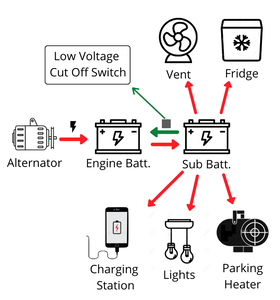
All campervans feature a dual battery system with a high-tech sub-battery that charges while driving. If you drive for a few hours a day (2-3hrs), you should be able to charge your phones, keep the fridge on low power, and use the parking heater at night without the engine running.
- The campervan's electronics (connected to the sub-battery) cannot discharge the engine battery. However leaving the headlights, front cabin light, or ignition turned on for a while will drain the main battery and potentially damage it.
- A 100V inverter for charging laptops or camera batteries requires a lot of power and should only be used when the sub-battery is full or the engine is running.
- Charging the van via external power is only possible in motorhomes at auto camping grounds or RV parks.
Some campervans in the winter season are equipped with a parking heater, allowing you to warm up your van and sleep comfortably without using the engine. The heater runs on fuel (takes about 4 litres per night) and the sub-battery, so make sure your vehicle is at least half-tanked and the battery well-charged.
Please strictly follow the instructions below:
1. Park the van in a desired location (van must be stationary when using the heater)
2. Make sure the Vent and Combustions system inlets / outlets are not blocked with anything (for example loose leaves, snow, plastic bags). The combustion system inlets and outlets are located under the vehicle
3. Confirm your current altitude. Heater cannot be used at altitudes over 1,500 meters
4. Open a window or the roof vent (a small gap will do)
5. Keep the engine running for a few minutes to provide extra battery charging (the heater uses a lot of power to preheat the glow plugs inside the unit)
6. Set the thermostat to max temperature and turn the heater ON. Heater will start after a few minutes. Make sure you run the heater for minimum 30 minutes every time it starts.
Please strictly follow the instructions below:
1. Park the van in a desired location (van must be stationary when using the heater)
2. Make sure the Vent and Combustions system inlets / outlets are not blocked with anything (for example loose leaves, snow, plastic bags). The combustion system inlets and outlets are located under the vehicle
3. Confirm your current altitude. Heater cannot be used at altitudes over 1,500 meters
4. Open a window or the roof vent (a small gap will do)
5. Keep the engine running for a few minutes to provide extra battery charging (the heater uses a lot of power to preheat the glow plugs inside the unit)
6. Set the thermostat to max temperature and turn the heater ON. Heater will start after a few minutes. Make sure you run the heater for minimum 30 minutes every time it starts.
|
Please see separate section dedicated to parking heater:
|
17. NO COOKING STRONG-SMELLING FOODS
Cooking fried chicken, fish, bacon, or spicy meals like curry etc. will leave an unpleasant odour in your campervan that will last for weeks and must be charged additional cleaning fee.
Please note that outdoor cooking is prohibited in road stations, highway parking areas, and busy public parking lots.
Please note that outdoor cooking is prohibited in road stations, highway parking areas, and busy public parking lots.
Please return the van to the same place as the pick-up (Tomisato office). You can easily find it on Google Maps by entering ‘’Japan Campers’’. Remember about extra cleaning fees and follow the drop off procedure:
- Please inform us in advance (1 day before if possible) about the estimated drop off time.
- Please fill up the van with fuel near our depot before returning.
- Throw away all the rubbish. You can do it at any convenient store, highway parking area and at some gas station, but don’t forget to segregate your waste. We charge 3000 JPY to use our garbage disposal.
- Get rid of wastewater from the water tank. You can do it in road stations' toilets, roadside drains or just in nature, if it does not contain chemicals
- Make sure to log out of your private accounts (emails, social accounts etc.) before returning the iPad.
- Free shuttle bus operates between 9:00 am until 5pm - Please return the van before 16:30 to ensure that the bus is free of charge.
Check-out charges:
- Van cleaning fee: up to 8,000 JPY (motorhome up to 15,000 JPY), the fee may be lower if the van comes back clean
- Bedding cleaning fee: 1,000 JPY / person
- Rubbish disposal fee: 3000 JPY (the amount of rubbish is irrelevant - using our garbage station cost 3000 JPY
- Additional data charge: 1,000 JPY / 1 GB (if use more then the limit)
- Shuttle Bus to the station / airport between 5pm - 9am - extra charge depends on the time.
19. iPAD USAGE

When using the iPad please observe the following points:
- Always connect to a charger while driving, because GPS uses a lot of power while in use.
- Never let the iPad to discharge to less than 5%. Once the iPad is discharged, it may take up to 30 minutes before it re-starts.
- Never try to complete Software Updates as it requires lots of mobile data and passwords which we do not share.
- iPads have no Screen Lock passwords enabled. Please do not enable them.
- iPads will use some mobile data when in idle mode. Please always switch the iPad off at night to avoid unnecessary data usage.
Please let us know if you are not familiar with the iPad, including various buttons, how to "kill" running applications, how to reboot the iPad and how to take a screenshot, etc.
20. POCKET WIFI USAGE

Pocket WiFi is a small, portable mobile router that allows multiple devices to connect to the network at the same time. Here are some tips for using our pocket wifi:
- A full battery can only last a few hours, so keep it charged in USB ports constantly.
- Do not connect the wifi to your mobile devices unless you have purchased the extra data plan. The standard data plan is sufficient only for using our iPad apps.
- Once you reach the daily limit, the internet connection will not stop, so it is your responsibility to keep track of it.
- While connected, your phone will be on WiFi network, not on cellular network, so internet usage is usually much higher than when using a SIM card, and its easy to lose all your data in a few days without your knowledge. Here are some tips on how to save data:
- Turn on Low Data Mode / Data Saver Mode in WIFI settings
- Turn off photo and video auto-syncing
- Turn off automatic app and system updates
- Turn off apps running in the background / background app refresh
- Limit a video calls, social media, streaming platforms, etc., and adjust your audio and video quality settings to save on data use.
21. USING GOOGLE MAPS for NAVIGATION:
- Do not follow blindly the GPS. It will always try to direct you through the shortest way (often too narrow road) which is sometimes not suitable for campervans. Here in Japan there are plenty of very narrow streets that Google Maps considers as a normal public roads. Always stay on the main roads (national roads with numbers) instead of saving a few minutes and suffer in the narrow, sneaky, rural streets.
- GPS does not work in tunnels so you need to relay on road signs (common in Tokyo)
- GPS gets very confused if the roads are multilayered (for example highway is above the normal road) and it may give you contradicting information.
- Do not use Satellite View for navigation as it uses enormous amounts of data.
22. TRAVEL APPLICATIONS:
Camp & Travel Japan
|
The new Japan Campers mobile application features our choice of locations for the road trip:
|
Only for our customers, we provide a premium version with secret locations and a TRIP section where you can find roadtrip plans. A special one-time activation code was sent with the booking confirmation. Ask the staff if you didn't get it.
Download links:
Michi
23. FAQ
Where to fill the fresh water tank?
Water taps can be found at campsites or sometimes in parks. If you have trouble finding them, use the toilets at the road station.
Is tap water safe to drink?
Yes it is. However, the Japanese use it more for cooking than for drinking, because in most areas the water is chlorinated.
Where to dispose the waste water?
You can do this in toilets, rainwater drains near the road or, if chemical-free, in nature
Where to dispose of garbage?
- Highway Parking Areas are the best places to do it, accessible 24 hours a day bins are located outside, where you can freely empty your van of garbage
- Convenience stores accept small amounts of garbage, allowing you to dispose of a reasonable amount of segregated waste each time you shop there. To avoid bringing large bags of garbage to the store, segregate them already in your van.
- Bins can also be occasionally found at road stations (Michi no Eki) and gas stations.
Where to overnight stay in a van? Is a wild camping allowed?
You can park and sleep on road stations (Michi no eki), highway parking areas, paid parking, public parking lots near parks, lakes, beaches (make sure that overnight stay is not prohibited and the parking is open 24hrs). Wild parking is usually a private property, staying overnight may result in police intervention.
Camping by the van and cooking outside are not welcome in the parking lots. There are many auto camping grounds where you can do this, but keep in mind that you need to book in advance to use them.
Camping by the van and cooking outside are not welcome in the parking lots. There are many auto camping grounds where you can do this, but keep in mind that you need to book in advance to use them.
Travel hygiene
- Free toilets in Japan are literally everywhere. All road stations, convenience stores and Park and Sleep locations on our mobile app have them.
- Showers can only be found at a few campsites, near beaches or at some petrol stations.
- Public baths (sento) and hot springs (onsen) are places where you can take a shower and relax in a hot bath after a long drive. They can be found in every city. Most of them are gender-separated, where you have to enter naked, cost an average of 700 yen with shampoo and soap usually included.
You can find them using the "Michi" app, which also searches for mixed-gender baths, family private baths, free onsen, and so on. Private baths are especially recommended for people who have tattoos, as most public baths prohibit them.
Supermarkets
Aeon, Beisia, Valor, Gyomu, Sanoya, Coop, etc. are the main supermarket chains, but each region has a different supplier, so it's not worth relying only on these. In general, prices in supermarkets are similar and cheaper than in covinience stores. You can easily find them by typing "supermarket" in google maps. Pro tip: Many groceries are discounted before the store closes.
24. ADVICE POINTS BASED ON OUR EXPERIENCE (sometimes a sad one) - how to save $$$

1. Drive well-rested, and avoid driving at night or in bad weather conditions. Brake frequently and do not rush - you are on vacation! Know and follow driving rules; as a warning, this is what can happen if you do not STOP at the "STOP" sign:
|
2. 90% of accidents, damages and small scratches happen when moving or parking the van backwards. We strongly advise you to use your partner to assist you every time you drive back. Park as far away from other cars as possible to avoid a collision. Even minor scratches to another vehicle must be reported to the police, and you will most likely be charged the full excess fee. |
4. Most mountain roads have unmarked trenches for the water access to be removed from the roads. Be careful not to drive into them as this will probably result in damage to the undercarriage.
Driving into a trench is categorised as "careless driving" and you are responsible for the repair costs.
Driving into a trench is categorised as "careless driving" and you are responsible for the repair costs.
5. During winter time, roads inside tunnels are usually covered with invisible black ICE. Drive really slowly because no tires will help you control the van on ice. Causing an accident on ice is usually categorised as "Careless Driving" and you may not be covered by our insurance.
Winter tires do not make magic. They will only help you driving on SNOW. Please remember that there could be ice under the snow. NO TIRES will stop the van on ICE.
Winter tires do not make magic. They will only help you driving on SNOW. Please remember that there could be ice under the snow. NO TIRES will stop the van on ICE.
Thank you for your time!
Have a safe trip!


